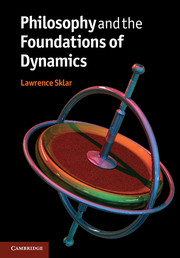Book contents
- Frontmatter
- Contents
- Chapter 1 Introduction
- Chapter 2 The pre-history of classical dynamics
- Chapter 3 The astronomical revolution
- Chapter 4 Precursors to Newtonian dynamics
- Chapter 5 The Newtonian synthesis
- Chapter 6 Philosophical aspects of the Newtonian synthesis
- Chapter 7 The history of statics
- Chapter 8 The development of dynamics after Newton
- Chapter 9 The “Newtonian” approach after Newton
- Chapter 10 From virtual work to Lagrange's equation
- Chapter 11 Extremal principles
- Chapter 12 Some philosophical reflections on explanation and theory
- Chapter 13 Conservation principles
- Chapter 14 Hamilton's equations
- Chapter 15 Canonical transformations, optical analogies and algebraic structures
- Chapter 16 The search for new foundations
- Chapter 17 New directions in the applications of dynamics
- Chapter 18 Spacetime formulations of Newtonian dynamics
- Chapter 19 Formalization: mass and force
- Chapter 20 Relationist dynamics
- Chapter 21 Modes of explanation
- Chapter 22 Retrospective and conclusions
- References
- Index
Chapter 4 - Precursors to Newtonian dynamics
Published online by Cambridge University Press: 05 December 2012
- Frontmatter
- Contents
- Chapter 1 Introduction
- Chapter 2 The pre-history of classical dynamics
- Chapter 3 The astronomical revolution
- Chapter 4 Precursors to Newtonian dynamics
- Chapter 5 The Newtonian synthesis
- Chapter 6 Philosophical aspects of the Newtonian synthesis
- Chapter 7 The history of statics
- Chapter 8 The development of dynamics after Newton
- Chapter 9 The “Newtonian” approach after Newton
- Chapter 10 From virtual work to Lagrange's equation
- Chapter 11 Extremal principles
- Chapter 12 Some philosophical reflections on explanation and theory
- Chapter 13 Conservation principles
- Chapter 14 Hamilton's equations
- Chapter 15 Canonical transformations, optical analogies and algebraic structures
- Chapter 16 The search for new foundations
- Chapter 17 New directions in the applications of dynamics
- Chapter 18 Spacetime formulations of Newtonian dynamics
- Chapter 19 Formalization: mass and force
- Chapter 20 Relationist dynamics
- Chapter 21 Modes of explanation
- Chapter 22 Retrospective and conclusions
- References
- Index
Summary
Many threads were finally woven together in the great Newtonian synthesis from which all further developments in classical dynamics followed. In this chapter we will outline a few of the major contributions to dynamics that followed the Copernican revolution in astronomy, but preceded the final accomplishment of a full theory that we can recognize as classical dynamics. Three names dominate this early work on dynamics, those of Galileo, Descartes and Huyghens, but, as we shall see, important contributions were made by less well-known figures as well.
Galileo
Almost everyone would give Galileo credit for initiating the great revolution in dynamical theory that ultimately led to Newtonian classical dynamics. But, as is the case in the work of many originators of a new science, there is no simple way of characterizing Galileo's contribution. His work, while being innovative in a revolutionary way, retains much that in retrospect seems quite conservative in its nature, borrowing much in the way of concepts, views and arguments from his predecessors. His exposition is sometimes quite informal, presented in the form of a charming dialogue in some cases. This sometimes makes it rather difficult to say exactly what Galileo believed, since, in some crucial cases, he seems to hold a number of distinct opinions simultaneously. In some crucial cases we would now be inclined to think that Galileo got things very wrong indeed. But even in his errors he provides deep enlightenment.
- Type
- Chapter
- Information
- Philosophy and the Foundations of Dynamics , pp. 33 - 45Publisher: Cambridge University PressPrint publication year: 2012



